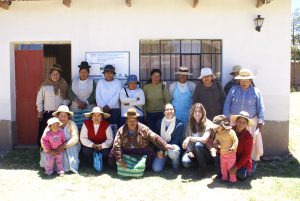This research is based on a development project carried out by GESPLAN Research group since 2007 with an Aymara women´s organization in the Andean region of Puno (Peru) around the Titicaca Lake. It is a sensitive area where natural resources are used inappropriately and the local communities are among the poorest in the country. Some strategies for diversifying the rural livelihoods as a means of escaping to poverty refer to non-agricultural activities such as commercialization of craft production, of which since the 1980´s the hand-knitting of textiles has become important in the rural economy.
The aim of the development project is to strengthen the women´s technical and entrepreneurial capacities in order to increase their autonomy and become leaders in the sustainable development of their communities. After a series of initial workshops, the project started in 2008 and the organization was legally established under the name Coordinadora de Mujeres Aymaras (CMA). The CMA currently comprises 300 women organized in 16 groups that are distributed in 5 districts. They receive support from a local technician from UPM who is in permanent contact with the organization. They are in contact with international designers and have received training in knitting and business and are participating in promotion events.

SONY DSC
The research aims at answering the following questions: What do we mean by capacity development and capacity building?; Are there certain capacities needed to manage a project successfully?; How can we measure capacity development?; Is there a relationship between capacity development and leadership development? Can we propose a model for monitoring and assessment of capacity development for leadership in the context of rural development projects?; and Is there a link between capacity development and a better planning and management of rural development projects?
The research presents an initial conceptual phase, which addresses the theoretical framework, analyzing and clarifying the concepts of capacity development, competencies and leadership in the context of rural development projects. Also, at this stage the main instruments to assess capacity development are classified so as to define the variables that shape the capacity construct. Besides the multidimensionality of the concept of capacity is determined and therefore the convenience of addressing it at an individual and collective level. Different leadership styles are also analyzed to propose a definition of capacity development and leadership adapted to the rural environment.
The above theoretical framework allows to set, in a second research phase, the scientific basis of the proposed model: the model DCL of Capacity Development for Leadership in rural development projects. This model incorporates elements of the conceptual framework Working With People, the result of 25 years of experience in the field of project planning for rural development from the research group GESPLAN of the Technical University of Madrid. The DCL model integrates quantitative and qualitative methodologies and a double scale of analysis to promote and evaluate capacity development in the local population from three components: technical-entrepreneurial, relational and contextual. Besides the DCL model incorporates a methodological process to integrate monitoring and evaluation of capacities throughout the project cycle.
Finally, in an application phase, DCL model validation is undertaken through the case study of a development project with an organization of women artisans of Aymara communities in Puno (Peru). This project, that incorporates the WWP conceptual framework, integrates 5 years of experience with Aymara communities from GESPLAN research group. The application shows how the DCL model allows to assess the development of capacities for leadership. Also, the incorporation of lessons learned after monitoring and evaluation of capacity development allows to redirect actions to improve project planning and management and produce a true empowerment and leadership of the local organization. This translates into increased project sustainability and social resilience of the organization.
From Project to Paper: contributions to Books and Journals
- PhD: Desarrollo de capacidades para el liderazgo en proyectos de desarrollo rural. Aplicación a comunidades Aymaras
- Sastre-Merino, S., Negrillo, X., & Hernández-Castellano, D. (2013). Sustainability of Rural Development Projects within the Working With People Model: Application to Aymara Women Communities in the Puno Region, Peru. Cuadernos de Desarrollo Rural, 10 (70), 219-244
- Sastre-Merino, S. Leadership development in rural development projects: a case study in an aymara women organization in Puno (Peru). En: José Luis Ayuso, Jose Luis Yagüe, Salvador Capuz (Eds.) Project Management and Engineering. Lecture notes in Management and Industrial Engineering. 2015. Switzerland: Springer
- Sastre-Merino, S.; Vidueira, P.; Diaz-Puente, J.M.; Fernández-Moral, M.J. Capacity building through empowerment evaluation: an aymara women artisans organization in Puno, Peru. En: David Fetterman, Shakeh J. Kaftarian & Abraham H. Wandersman (Eds.) Empowerment Evaluation: Knowledge and Tools for Self-assessment, Evaluation Capacity Building, and Accountability. 2014. California: SAGE.
- Sastre-Merino, S., & Fernández-Moral, M. J. Social capacity building in rural Aymara women organizations in Puno, Peru. 6th International Conference “Rural development 2013: Innovations and sustainability”. Lituania: 28-29 November 2013
- Negrillo, X., Hernández, D., & Sastre, S. La participación de los beneficiarios en el ciclo de los proyectos de desarrollo. 17th International Congress on Project Management and engineering. Logroño, July, 17-19th 2013
- Sastre, S., & De los Ríos, I. Project management competence analysis in rural communities through territorial representation: application to Aymara women communities in Puno (Peru). 2nd International Conference on Applied Social Science, 1-2 February, 2012, Kuala Lumpur, Malaysia. Pp 402-410. ISBN: 978-1-61275-006-4


